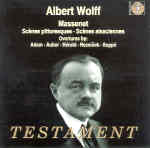Conductor Albert Wolff’s photo on the cover of this first-rate, well-filled CD easily could be mistaken for that of a provincial French bank manager. Though little known today, he was an accomplished interpreter whose career included stints at the Metropolitan Opera, the Lamoureux Orchestra, and an extensive association with Paris’ Opéra-Comique. He premiered major works by Poulenc and Roussel among others, and even programmed Mahler for his recalcitrant French audiences. After the war he made some wonderful recordings with the Paris Conservatory Orchestra for Decca/London, many of which, including these, are treasured by connoisseurs of Romantic French music.
Some of those Deccas were among the first stereo recordings ever made, and the sound on the Massenets (from 1955) is more realistic than on many modern recordings, showing its age only in the faintest hint of roughness in some of the bigger climaxes. The engineering captures the sound of the venue, Paris’ Maison de la Mutualité, offers true dynamics, unexaggerated pianissimos, and orchestral details that are buried in most recordings. None of which would matter if the performances weren’t up to snuff, but they’re the best versions of these works I’ve heard.
The Scènes pittoresques is wonderfully paced. Wolff perfectly balances the horns in the Angélus movement, brings out the organ-like winds at its end, and without rushing makes the closing Fète bohème a light-hearted romp. Scènes alsaciennes is even better. The first movement paints a lovely Sunday morning scene; the second is a rustic dance with shining brass. The third movement, an evocation of a peaceful village scene, features a luminous solo cello theme delicately haloed by winds and echoed by the clarinet, followed by the two instruments dueting. The playing here by the anonymous orchestral soloists is ravishing. The rocking finale opens with a bustling evening scene and then revisits Boccherini territory, with a musical depiction of the drums and bugles of an army retreating to its barracks, after which the raucous dance closes the piece.
The other half of the disc consists of five opéra-comique overtures from 1957 that are even more spectacularly engineered. All five share a similar jaunty spirit; passages of the Adam and Auber could be mistaken for Rossini, and the Hérold indulges in some flashy dramatics. When they’re played at all these days, they’re often overdone as orchestral showpieces, smothered by displays of orchestral virtuosity. Wolff here shows his theatre experience, having conducted them many times in the context of the complete operas. He brings a lightness of touch and natural phrasing to the music that, while not disguising its failings, makes these works hugely enjoyable.
































